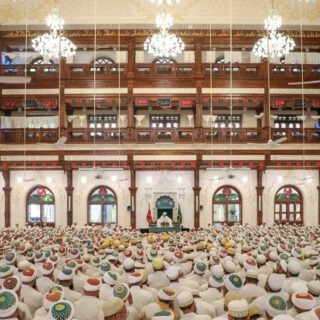20th ShehrAllah 1441 H
The first revelation of the Quran to Nabi Mohammed SA was the ayah ‘iqra…’ in Surah al-Alaq. When Rasul Allah SA was in Ghar Hira, Jibraeel descended upon him and revealed the first five ayahs of this surah. Al-Dai al-Ajal Syedna Mufaddal Saifuddin TUS has expounded upon the meanings of these five ayahs in his composition ‘Allam al-Insan Ma Lam Yalam Ek Ijaaz He’
In the first ayah, Allah states, O, Mohammed, read in the name of your Lord, the one who has created. The Quran’s first revelation is iqra, read, underscoring the fact that Islam’s call has always been towards illuminating one’s self through knowledge and education.
Second to Allah, the most common word in the Quran is ilm, and its various derivatives. The combination of iqra (read) and bi ism rabbika (in the name of your Lord) reveals that Allah is the source of all knowledge, and that all learning takes place by His grace and mercy. In 1336 H, al-Dai al-Ajal Syedna Taher Saifuddin RA commenced the education of Syedna Mohammed Burhanuddin in Udaipur with reciting the bismillah.
In the 2nd ayah, Allah states that that man was created from a clot. Man was non-existent, and yet from a small clot he was created and bestowed with such abilities. Likewise, at the onset man is devoid of knowledge, but by the presence of a mentor who fosters the development of his intellect, he is able to perceive and comprehend the most of complex of matters.
In the 3rd ayah, Allah Taala once again stresses upon Nabi Mohammed AS to read and recite. This is why Rasul Allah SA has stated , ‘seeking knowledge is compulsory upon all Muslims and Muslima’. Just as namaz is compulsory, the pursuit of knowledge is granted the same status.
The 4th and 5th ayahs state that man was taught by the Pen, and he was taught that which he knew not. After reading, the Quran moves on to another fundamental of education: writing. Imam Ahmed al-Mastur AS states that man first learns to speak, then to read and finally to write and this is the order set out in this surah. The final ayah states, ‘do sajda and attain closeness [to Allah]’ indicating that the outcome of all learning is humility and good character, and only then can man attain closeness to his Creator and further his learning.
One question put towards the students of Aljamea-tus-Saifiyah during this year’s Imtihan Sanawi asked about the benefits of positive thinking.
In one of his munajat, Maulana Ali AS states that:
‘And many for Allah are the hidden favour * unperceivable even to the sharpest mind’.
‘And how so often does relief follow strife * easing the burden of the heavy heart’.
‘And so many a matter that disheartens in the morning * is followed by joy that comes to you in the evening’.
‘When one day you are stifled by circumstances * Then have faith in the One and Only, the Lofty’.
‘Take recourse in the nabi, for every difficulty * Is relieved when recourse is taken in him’.
‘And do not despair whenever misfortune strikes * For many for Allah are the hidden favour’
The verses of this munajat are recited when one does the ziyarat of Maulatona Zainab AS in al-Qahera.
Syedna al-Muayyah al-Shirazi RA states that in one of tenth of the hardships that befell Maulana Imam Husain AS in Karbala, there is solace from me from all my troubles and worries. Al-Dai al-Ajal Syedna Mohammed Burhanuddin RA repeatedly prayed, ‘may Allah keep Mumineen happy and prosperous and show them no grief but that of Imam Husain AS’. In remembering the grief of Imam Husain AS all our worries and troubles are dispelled and we are able to remain positive by placing our faith and trust in Allah and His beloved Awliya AS.
The importance and benefits of remaining positive can be seem from the perspective of the four cornerstones of: ilm (knowledge), amal (deeds), akhlaq (character) and aqida (belief)
Ilm
The pages of history reveal that Yahya Nabi ‑ always remained grim citing the fear of Allah’s punishment while Eesa Nabi AS was always cheerful placing his faith in Allah’s mercy. Allah adjudicated between the two stating, ‘the dearest of the two to me is the more cheerful of them’.
In Surah al-Sharh, Allah Taala states, ‘For indeed, with hardship there is ease. Indeed, with hardship there is ease’. A Mumin is required to show patience and forbearance in face of any adversity that comes before him.
One night before a legal proceeding someone came to al-Dai al-Ajal Syedna Taher Saifuddin RA and warned him of the strife and discord that will prevail in the community. Syedna Taher Saifuddin RA rebuked him, ‘tell the person who sent you that I am not at all intimidated by such threats, and tonight I will sleep just as peacefully as I have during previous nights’.
Amal
Awliya Allah AS have bestowed Mumineen with various means of ensuring a positive and healthy mindset. One way is through the recitation of the Quran. A Mumin should recite at least one ruku a day.
Syedna Mohammed Burhanddin RA directed those who find it difficult to sleep at night to do the tasbih of ‘la haul…’ 40 times before going to bed. Likewise, doing the tasbih of the ayah ‘alaa bi zikr Allah….’ 110 times relieves one of grief and worry.
Remaining idle adds to one’s worries. If one wishes to dispel his fears then he is required to also make an effort in that direction. If one tends to a piece land then it is much more likely that he will see the fruits of his labour, instead of just sitting there hoping that something grows. Syedna Mufaddal Saifuddin TUS directs us that one can seek Allah’s mercy by taking the wasila of Awliya Allah AS and undertaking good deeds.
Akhlaq
Syedna Mohammed Burhanuddin RA counselled us on numerous occasions to remain happy and cheerful. There is no need to become disheartened, worries will come and go. If you are ever burdened by a grief then it should remain in your hearts, for a Mumin is one whose face is smiling while his grief remains in his heart. The positivity brought about by a cheerful and smiling face benefits all those around us.
Aqida
One should realize that whatever hardships he faces are due to his sins, and due to them his sins are being forgiven. Thus he should remain positive in that he is undergoing a process that cleanses and purifies him. Additionally, developing a mindset that the eventual outcome of all situations will be good makes one optimistic. It is said that a Mumin’s dua will always be answered for as long as he does not act in haste. After praying and finding that he has not received what he sought, he hastily concludes that his prayers have not been answered. Instead he is required to remain positive and believe that Allah will listen.
A positive attitude also allows one to give his brethren the benefit of a doubt. If someone doesn’t attend, for example, a wedding reception instead of formulating negative thoughts about his absence, consider the fact that he may not be in town, an emergency may have arisen, he may not be well. In some circumstances these negative thoughts build up to such an extent that he stops attending all his functions even to the extent of forgoing his funeral.
On the day of Ashura, despite the sheer weight of the hardships he faced, Maulana Imam Husain AS prayed to Allah Taala, ‘O Allah, you are my confidant in all difficulties and my desire in all hardships….’ He also directed his Ahle Bait and Ashab AS to apply musk. One of them asked another is this a time for joy and happiness? His companion replied, ‘Yes, for we will soon attain shahadat and enter jannat. Why shouldn’t we be happy?’








